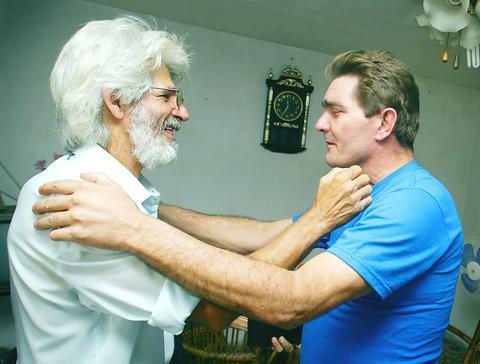International rights groups welcomed Cuba's surprise release of three dissidents jailed last year in a broad crackdown, and called on President Fidel Castro's government to free another 65 still behind bars.
The three men were freed unexpectedly early Monday for health reasons, according to friends, relatives and local rights activists, sparking hopes for additional releases in the coming days.

PHOTO: AP
"Cuba's release of these political prisoners is a welcome move, but many more remain incarcerated in violation of their fundamental rights," said Jose Miguel Vivanco, Americas director at Human Rights Watch. "We call on the Cuban authorities to release all of them."
Those freed on parole included economics writer Oscar Espinosa Chepe, who was hospitalized behind bars for months with a liver ailment. Espinosa Chepe's cause has become well known among some rights groups outside Cuba.
"I'm feeling happy now," Espinosa Chepe told reporters at his Havana home, noting that Monday was his 64th birthday. "I had been really pessimistic. I didn't think I was going to be let out."
Also freed early Monday for health reasons were dissidents Marcelo Lopez and Margarito Broche. Lopez has a neurological disorder, and Broche suffered a heart attack behind bars in August.
The latest releases bring to 10 the number of dissidents in the original group of 75 who have since been freed after being sentenced to prison terms ranging from six to 28 years in April last year. All were released for medical reasons.
They were charged with working with the US government to undermine Castro's socialist system, something the dissidents and US officials denied.
Vivanco regretted that the three men released on Monday were freed on parole, rather than unconditionally.
"By granting them parole only, the Cuban government leaves open the possibility of returning the dissidents to prison to serve out their sentences in the future," Vivanco said. "It's a way of intimidating them from exercising their fundamental rights."
The New York-based Committee to Protect Journalists said it was gladdened by the release of Espionsa Chepe, one of more than two dozen independent Cuban journalists held behind bars on the island.
"Their only offense was doing their jobs," said the committee's Executive Director Ann Cooper.
After his release, Espinosa Chepe spoke from his book-filled living room, where a small Christmas tree sat atop a refrigerator in the corner. Despite the difficulties suffered in jail, Espinosa Chepe said did not want to leave Cuba.
"I feel Cuban and I want to die in my own country," he said.

VAGUE: The criteria of the amnesty remain unclear, but it would cover political violence from 1999 to today, and those convicted of murder or drug trafficking would not qualify Venezuelan Acting President Delcy Rodriguez on Friday announced an amnesty bill that could lead to the release of hundreds of prisoners, including opposition leaders, journalists and human rights activists detained for political reasons. The measure had long been sought by the US-backed opposition. It is the latest concession Rodriguez has made since taking the reins of the country on Jan. 3 after the brazen seizure of then-Venezuelan president Nicolas Maduro. Rodriguez told a gathering of justices, magistrates, ministers, military brass and other government leaders that the ruling party-controlled Venezuelan National Assembly would take up the bill with urgency. Rodriguez also announced the shutdown

Civil society leaders and members of a left-wing coalition yesterday filed impeachment complaints against Philippine Vice President Sara Duterte, restarting a process sidelined by the Supreme Court last year. Both cases accuse Duterte of misusing public funds during her term as education secretary, while one revives allegations that she threatened to assassinate former ally Philippine President Ferdinand Marcos Jr. The filings come on the same day that a committee in the House of Representatives was to begin hearings into impeachment complaints against Marcos, accused of corruption tied to a spiraling scandal over bogus flood control projects. Under the constitution, an impeachment by the

China executed 11 people linked to Myanmar criminal gangs, including “key members” of telecom scam operations, state media reported yesterday, as Beijing toughens its response to the sprawling, transnational industry. Fraud compounds where scammers lure Internet users into fake romantic relationships and cryptocurrency investments have flourished across Southeast Asia, including in Myanmar. Initially largely targeting Chinese speakers, the criminal groups behind the compounds have expanded operations into multiple languages to steal from victims around the world. Those conducting the scams are sometimes willing con artists, and other times trafficked foreign nationals forced to work. In the past few years, Beijing has stepped up cooperation

Exiled Tibetans began a unique global election yesterday for a government representing a homeland many have never seen, as part of a democratic exercise voters say carries great weight. From red-robed Buddhist monks in the snowy Himalayas, to political exiles in megacities across South Asia, to refugees in Australia, Europe and North America, voting takes place in 27 countries — but not China. “Elections ... show that the struggle for Tibet’s freedom and independence continues from generation to generation,” said candidate Gyaltsen Chokye, 33, who is based in the Indian hill-town of Dharamsala, headquarters of the government-in-exile, the Central Tibetan Administration (CTA). It